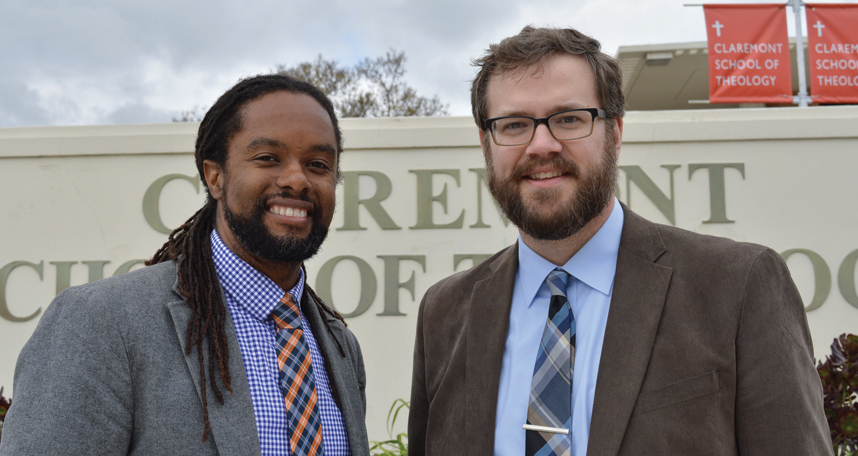CST colleagues focus on role of emotions in tackling racism

While many anti-racism programs ask participants to set aside their complex feelings around race and racism, the Rev. Dr. Christopher Carter and Dr. Seth Schoen believe that when emotions are left unattended, they create conditions for racial stressors. They consider emotions to be effective guideposts for sustainable anti-racist work.
Recently, the colleagues received Claremont School of Theology’s Distinguished Alumni in Collaborative Ministry Award. Christopher graduated from CST in 2017 with Master of Divinity and Doctor of Philosophy degrees. Seth earned a Master of Arts in 2012 and a Ph.D. in 2018. The two were nominated for their anti-racism training called “Racial Resilience” (www.racialresilience.com). They present their program in local churches across the United States, as well as in academic settings.
“Racial Resilience,” Seth explained, “was born out of the friendship that Chris and I share, and became the focus of my dissertation. We saw many anti-racist trainings mostly trying to control the role of emotions in this process, sometimes trying to leave them out altogether, simply not acknowledging their existence, or saying that people shouldn’t feel certain feelings.
“Human beings make sense of the world through emotions, not despite them,” he continued. “We created Racial Resilience using the ‘compassion practice’ as the basis for how we would go about understanding ourselves and others, which would then make discerning sustainable anti-racist actions possible.”
Racial Resilience, Chris said, combines the wisdom and insight of critical race theories with contemplative practices. “We believe,” he said, “that racism is not only an intellectual problem. It is also an embodied problem. Racism and conversations about race, white privilege, and colonialism cause us to be reactive. Many of us, especially white people and people who grew up shielded from the realities of racism, haven’t developed the emotional resilience necessary to work through and understand our reactivities.
“On one level,” Chris said, “our program is designed to help people learn how to understand what is happening in their bodies in racially charged situations and to develop the ability to cultivate empathic compassion for other bodies when they are in racially charged situations.”
Compassion is the fundamental ingredient that sets Racial Resilience apart from other programs.
“We teach people how to cultivate self-compassion around our racial traumas,” Chris said. “This looks different for white and non-white peoples. Then we help them learn how to cultivate compassion for racialized others. Finally, we offer guidance for the discernment of an anti-racist compassionate action that helps us build the beloved community.”
“When people feel heard and understood, rather than judged, shamed, or dismissed,” Seth added, “connection becomes a real possibility. Perspective-taking becomes possible, and unforeseen possibilities emerge. This sets the stage for transformation.
“It is a difficult process of self-discovery toward fully embodying our humanness. When I see people get this in their bodies, not just their minds, it is deeply fulfilling. Racism inhabits us; it is a socialization process so deeply embedded that once I saw this for myself, I could only respond with a spiritual approach. I love when people get it in their souls.”
Working with groups who are not motivated to engage can be difficult, the men admitted.
The toughest part, Chris said, is dealing with “performative anti-racism” – people who claim they want to work for justice but, in reality, already are convinced that they are doing everything right. “To be sure,” he said, “we are trying to unlearn 500 years of structural evil. But it is the only way I know how to live out the solidaristic love-praxis of Jesus.”
“Our process is highly dependent on participant engagement,” Seth said. “White racialization involves lack of resilience and privilege. This is why we as white people have the most work to do to understand race and racism. We lack the resilience to engage anti-racism effectively, and our privilege blinds us to the horrifying realities of racism in most of their manifestations.
“A tough, behind-the-scenes aspect of our work is creating contemplative practices that foster deeper learning,” he continued. “Connecting personally and experientially to the ways that others experience racism, racial awakening, and the trauma that can come with this is important. We want to be aware of the potential things that can happen and have strategies for how to address them, but even with the most due diligence, unforeseen things occur. For me, this creates a tense but necessary situation for the kind of learning to which we are committed.”
The colleagues’ work has garnered mixed reviews. “Giving up and transforming foundational worldviews isn’t easy,” Seth acknowledged. “Resistance is to be expected. For those who are open to the spirit working in our midst, our work is more effective. Some are genuinely transformed.”
He loves it when participants stay after a session ends and share things that they’ve never felt comfortable sharing.
“This is a humbling, sacred experience for me,” Seth said. “It is soul work. These experiences also remind me of how much work there is to do because these kinds of spaces should not be rare. We want them to be normal.”
“These are difficult times,” Chris said. “Given the state of our judicial system and the gridlock in our legislative system, people feel stuck, silenced, and ignored. Offering the tools that people need to tend to their own selves – self-compassion – is as important now as it ever has been.”

